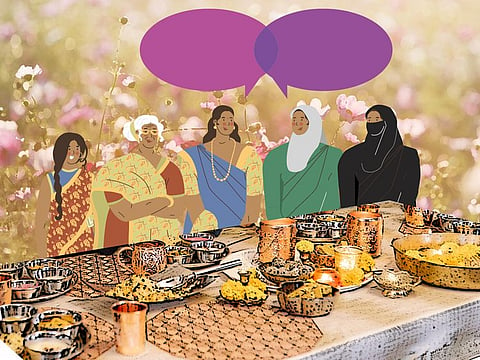An extraordinary iftar in India
Dastarkhwan-E-Mohabbat is a small idea backed by a profound and beautiful emotion

Last weekend, celebrity television anchor Marya Shakil invited me to an iftar dubbed Dastakhwan-e-Mohabbat (table of love).
I have attended many political iftars in New Delhi, arranged by political parties over the years, including iftars given by Congress leader Sonia Gandhi among others. I thought, instinctively, let’s go and meet new people and see how lavish the spread is.
But, the evening turned out be both evocative and stirring.
Around four years back, Noida-based Nazia Erum, author of Mothering A Muslim, wrote the post on Facebook inviting non-Muslim friends, saying “lets break bread together” on the eve of Ramadan (RamAzan).
A lot of non-Muslim Indians responded positively on her timeline. Many of them joined in-person. Her idea was to meet and share vital knowledge of each other’s faith while breaking the fast (Roza).
Slowly lots of Muslim women joined Nazia and the group called Dastarkhwan-E-Mohabbat was born. Right now, more than a dozen well-educated, professional women are organising the iftar at different places during Ramadan “to break the bread” with their non-Muslim friends.
In a house in Noida it turned out to be an inter-faith iftar with a soulful conversations.
Each member of the group invites three to four non-Muslim friends. The gathering of around 50 people meets over food, which certainly has lots of vegetarian dishes, too.
All hosts, members of this organically grown group, brings one or two homemade food dishes for the table.
In Noida, this Sunday we were treated royally at Hana’s home. She is a pilot, works full-time and lives in style. The spread on her table — dastarkhwan — was as expected: sumptuous.
Of course, dates were there to break the fast. Rose sherbets, kebabs, biryani, plate full of mixed fruits, chicken samosas, dahi fulki (snacks from Awadh region), ghugni (chana/gram as made by Muslims of UP), paneer-mutter and vegetarian pulao sprinkled liberally with dry fruits, specially made for the vegetarian guests were on the table.
Pheni, rasgulla and sevia with saffron were laid out as desserts.
All hosts, the fasting women, had taken care to cook vegetarian and non-vegetarian food so that the Hindu, Sikh, Jain or Christian guests find it special.
Rana Safvi, historian and author, is also the member of the group who wants to spread basic knowledge about how Muslims live and pray and why they observe Ramadan.
She told Gulf News, “Ye dilo ke faasle kyon hote hai? Kyonki hum ek doosre ko bahut Kum jaante hai.” (Why are we divided? Because we don’t know each other enough.)
She added, “In urban India as the families are getting smaller, people know their surroundings and each other less. There are no grandparents around to share stories and not too many neighbours who are closer to us than our own blood relations. It is time to know each other.”
A profound emotion
Dastarkhwan-E-Mohabbat is a small idea backed by a profound emotion. Let Hindus know what is Islam all about and how do Indian Muslims live, and let the Muslims know how Hindus live and what are the fundamental tenets of the Hindu religion.
This is just a beginning, but this idea needs to expand in both communities.
In the current heated up political atmosphere in India, where politicians have brought the issue of hijab, loudspeakers in mosques and Hanuman Chalisa into mainstream public discourse, this small beginning to spread unadulterated knowledge about each other’s societies and religions is most needed in urban India.
Rana Safvi explains that in Lucknow her next-door neighbour used to be the Saxena family.
She says, “I can’t be carried away if someone talks nonsense about Hindus. I know them. I have lived with them. I tie a rakhee to the son of the Saxena family. I am well-versed with strengths of Hindu religion. But, in Metro cities, Muslims and Hindus don’t know even basic facts about each other.”
Another host and filmmaker Tasmeen Dhinojwala said, “The fear of unknown is dangerous. That fuels polarisation in the society. Let’s know each other. We are all same. Our daily struggles are the same.”
The gathering in the house in Noida was mix of all kinds of people. With some exceptions, most of the Hindu guests said they are attending an iftar for the first time. Most of the guests were surprised that while fasting, not even glass of water is taken between sunrise and sunset.
The host explained how Ramadan is all about self-control and introspection.
At 6.54pm, sunset time, everyone had dates and rose sherbet. One of the hosts explained how before breaking fast devotees thank Allah for giving them the ability to fast, and have self-discipline and self-control.
Rana Safvi concluded, “Ramadan is about jiqra and fiqra. We talk (jiqra) about God and we do introspection (fiqra) about how to be a better person.”
The hosts said short prayers, and, then everyone rushed to the table.
No one spoke about politics.
However, the message was conveyed through eyes and warm hugs. There was a bonhomie that said it all — we are all so similar, equal and familiar to each other.



